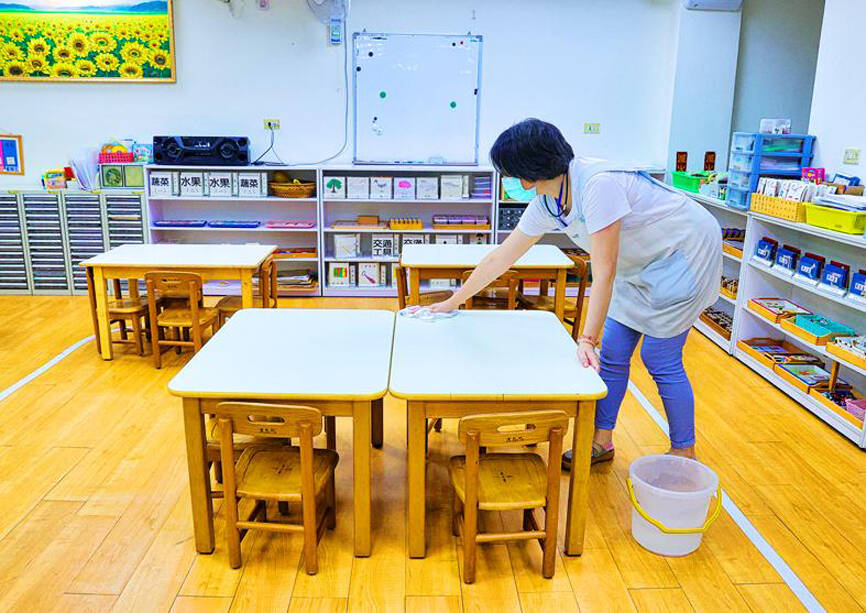Taiwanese medical researchers have linked air quality in kindergarten classrooms to increased risk of COVID-19 cluster infections, a research paper published in the journal Indoor Air showed.
The study is based on observed air quality in a Taipei-based kindergarten and viral transmission estimations utilizing the Wells-Riley model from August to November 2021, National Taiwan University Hospital researchers told a news conference earlier this month marking the article’s publication.
The research team found that carbon dioxide in classrooms and staff offices increases with use during the workweek, peaking each day in the afternoon, said coauthor Chen Chung-yen (陳宗延), an epidemiologist at the hospital.

Photo: CNA
The concentration of the substance — a counter indicator of air quality — reaches 850 parts per million in an average hour, assuming that 30 students are in a room, he said.
Carbon dioxide measurements are used as a proxy for aerosol concentrations as ventilation has about the same effect on both values, he added.
The air quality measurements indicated that the reproduction number of SARS-CoV-2, the virus that causes COVID-19, ranged from 3.01 to 3.12 during school hours, meaning an infected person would on average spread the virus to three people, Chen said.
The study suggests that reducing class sizes and the time spent indoors, and improving ventilation would decrease cluster infections, he said, adding that the air in a 33-ping room (109m2) containing 30 children should be changed 3.6 to 5.4 times per hour.
Ideally, a class should have two to 10 people spending no more than three hours in each room, but such conditions are unlikely to be met under real-world conditions, he said.
The research team recommends that kindergartens utilize air quality monitors, open-air classes and high-efficiency particulate air filters for poorly ventilated rooms to protect public health, he said.

TRAGEDY: An expert said that the incident was uncommon as the chance of a ground crew member being sucked into an IDF engine was ‘minuscule’ A master sergeant yesterday morning died after she was sucked into an engine during a routine inspection of a fighter jet at an air base in Taichung, the Air Force Command Headquarters said. The officer, surnamed Hu (胡), was conducting final landing checks at Ching Chuan Kang (清泉崗) Air Base when she was pulled into the jet’s engine for unknown reasons, the air force said in a news release. She was transported to a hospital for emergency treatment, but could not be revived, it said. The air force expressed its deepest sympathies over the incident, and vowed to work with authorities as they

A tourist who was struck and injured by a train in a scenic area of New Taipei City’s Pingsi District (平溪) on Monday might be fined for trespassing on the tracks, the Railway Police Bureau said yesterday. The New Taipei City Fire Department said it received a call at 4:37pm on Monday about an incident in Shifen (十分), a tourist destination on the Pingsi Railway Line. After arriving on the scene, paramedics treated a woman in her 30s for a 3cm to 5cm laceration on her head, the department said. She was taken to a hospital in Keelung, it said. Surveillance footage from a

BITTERLY COLD: The inauguration ceremony for US president-elect Donald Trump has been moved indoors due to cold weather, with the new venue lacking capacity A delegation of cross-party lawmakers from Taiwan, led by Legislative Speaker Han Kuo-yu (韓國瑜), for the inauguration of US president-elect Donald Trump, would not be able to attend the ceremony, as it is being moved indoors due to forecasts of intense cold weather in Washington tomorrow. The inauguration ceremony for Trump and US vice president-elect JD Vance is to be held inside the Capitol Rotunda, which has a capacity of about 2,000 people. A person familiar with the issue yesterday said although the outdoor inauguration ceremony has been relocated, Taiwan’s legislative delegation has decided to head off to Washington as scheduled. The delegation

Another wave of cold air would affect Taiwan starting from Friday and could evolve into a continental cold mass, the Central Weather Administration (CWA) said yesterday. Temperatures could drop below 10°C across Taiwan on Monday and Tuesday next week, CWA forecaster Chang Chun-yao (張竣堯) said. Seasonal northeasterly winds could bring rain, he said. Meanwhile, due to the continental cold mass and radiative cooling, it would be cold in northern and northeastern Taiwan today and tomorrow, according to the CWA. From last night to this morning, temperatures could drop below 10°C in northern Taiwan, it said. A thin coat of snow